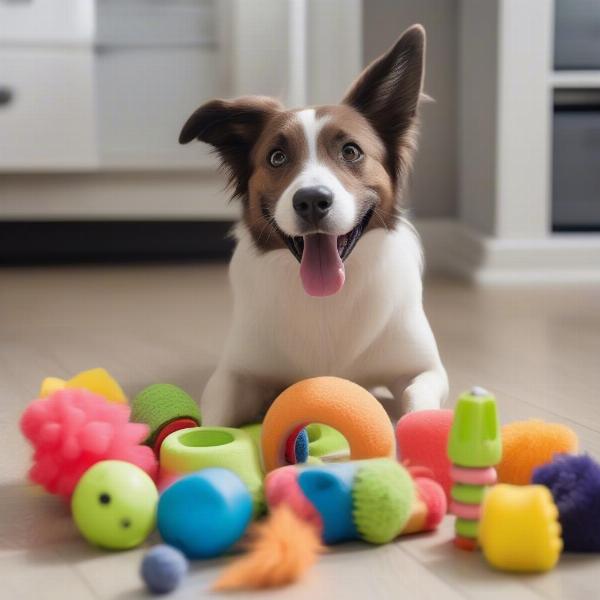If your dog ate a nicotine pouch, you’re understandably panicked. Nicotine, even in small amounts, can be toxic to dogs. This article will guide you through what to do if your dog ingests a nicotine pouch, the potential symptoms to watch for, and how to prevent this dangerous situation from happening again.
Understanding the Danger: Why Nicotine is Toxic to Dogs
Nicotine is a highly addictive stimulant found in tobacco plants and, increasingly, in nicotine pouches. These pouches, often marketed as a smokeless alternative to cigarettes, contain concentrated nicotine and pose a significant risk to pets. Even a small amount of ingested nicotine can cause serious health problems in dogs, ranging from mild tremors to seizures, respiratory failure, and even death. The severity of the reaction depends on the size of the dog, the amount of nicotine ingested, and the dog’s individual sensitivity.
What to Do if Your Dog Eats a Nicotine Pouch
If you suspect or witness your dog eating a nicotine pouch, immediate action is crucial:
- Remove any remaining pouches: Secure any remaining nicotine pouches out of your dog’s reach.
- Call your veterinarian or an emergency animal hospital immediately: Do not wait for symptoms to appear. Time is of the essence.
- Be prepared to provide information: Your veterinarian will need to know the type of nicotine pouch ingested (brand, flavor), the estimated amount consumed, your dog’s breed, age, weight, and any pre-existing medical conditions.
- Follow your veterinarian’s instructions: They may advise you to induce vomiting or bring your dog in for immediate treatment.
“Quick action is paramount,” says Dr. Amelia Shepherd, DVM, a board-certified veterinary toxicologist. “The sooner you seek veterinary care, the better the chances of a positive outcome.”
Symptoms of Nicotine Poisoning in Dogs
Nicotine poisoning in dogs can manifest in a variety of ways, including:
- Vomiting and diarrhea
- Excessive drooling
- Tremors or muscle twitching
- Difficulty breathing
- Rapid heart rate
- Weakness or collapse
- Seizures
- Coma
Preventing Nicotine Pouch Ingestion
Preventing nicotine ingestion is the best course of action. Here’s how:
- Store nicotine pouches securely: Keep nicotine pouches locked away in cabinets or drawers inaccessible to your dog. Never leave them lying around in purses, pockets, or on tables.
- Educate family members: Ensure everyone in your household understands the dangers of nicotine pouches to pets and the importance of proper storage.
- Be mindful of disposal: Dispose of used pouches safely in a sealed container out of your dog’s reach.
- Train your dog: Teach your dog basic obedience commands such as “leave it” and “drop it” to help prevent them from picking up potentially harmful items.
“Prevention is always better than cure,” advises Dr. David Grant, DVM, a specialist in small animal internal medicine. “Taking simple precautions can save your dog’s life.”
 Dog playing with safe toys
Dog playing with safe toys
Conclusion
Nicotine pouch ingestion can have serious consequences for your dog. Swift action and preventative measures are vital. By understanding the risks, recognizing the symptoms, and acting responsibly, you can protect your furry companion from the dangers of nicotine. If you suspect your dog has ingested nicotine, contact your veterinarian immediately. Don’t delay – your dog’s life may depend on it.
FAQ
- How much nicotine can a dog tolerate? Even small amounts of nicotine can be toxic to dogs. There’s no safe level of nicotine for canines.
- Can a dog recover from nicotine poisoning? With prompt veterinary care, many dogs can recover from nicotine poisoning. However, the prognosis depends on the amount ingested and the timeliness of treatment.
- What is the first thing I should do if my dog eats a nicotine pouch? Call your veterinarian or an emergency animal hospital immediately.
- Are there any home remedies for nicotine poisoning in dogs? No, there are no safe or effective home remedies. Veterinary care is essential.
- How can I prevent my dog from eating nicotine pouches again? Store nicotine pouches securely and out of your dog’s reach. Educate family members about the dangers and dispose of used pouches responsibly.
- What are the long-term effects of nicotine poisoning in dogs? In some cases, dogs may experience long-term neurological effects, even after recovery from the initial poisoning.
- Are certain breeds more susceptible to nicotine poisoning? Smaller dogs are generally more vulnerable due to their lower body weight, but any dog can be affected.
Related Articles
ILM Dog is your trusted resource for expert dog care advice. We offer guidance on everything from breed selection and health care to training, nutrition, and product recommendations. From puppy care to senior dog care, we’re here to support you every step of the way. Connect with us for personalized support: Email: [email protected], Phone: +44 20-3965-8624. Visit ILM Dog for more information.